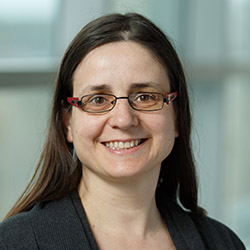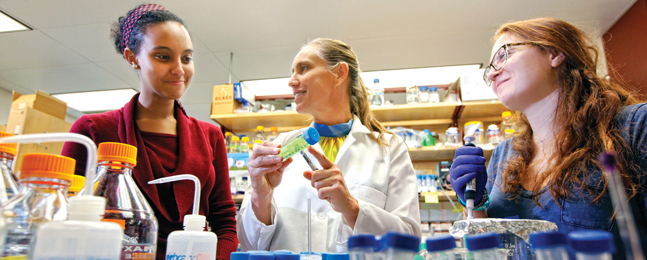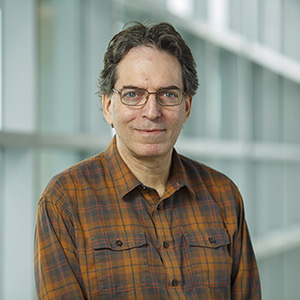[metaslider id=7028]
Since its construction at the heart of the Brandeis campus, the Volen National Center for Complex Systems has been a key focal point of the Brandeis campus. The structure was dedicated on October 20, 1994 and has served as a gateway to the Brandeis Science Complex for the past 25 years. Planning for the construction of the building began in 1989 with funding from the federal government. Additional funding from the government and donations from benefactors followed. The total cost of construction was over $31 million.
The Center’s primary focus is the study of one of the most complex of complex systems – the human brain and mind. When the Volen Center was formed in 1989, its mission statement was “to advance our understanding of cognitive processes, perceptions, neuroscience, and the development and application of parallel computer systems.” As part of this mission, a retreat was first held in May 1989. This retreat has evolved into the annual Volen Retreat. True to the collaborative focus of the Center, the Volen Retreat includes talks from multiple disciplines of Brandeis faculty. Thanks to the M. R. Bauer Foundation, a lecture series and week-long Distinguished Lecturer Visitors series brings scientists from all over the world to the Brandeis campus to talk about their research and interact with faculty, postdocs and graduate students.
The bricks and mortar of the Volen Center provided essential office and lab space. In addition to the building, new Brandeis faculty became a part of the Volen Center. Leslie Griffith joined the Center in September 1992. Susan Birren followed in July 1993 and Jordan Pollack in September 1994. Faculty and labs of Computer Science, Linguistics, Biochemistry and Neuroscience moved into the completed structure in May 1994.
What has been impact of the Volen Center? Barbara Wrightson, who was the Program Project Coordinator during the Volen construction and is now the Director of Budget and Planning in the Office of the Dean of Arts and Sciences, said that “the Volen Center helped to nurture the fabulous growth of the neuroscience program at Brandeis.” Additionally, shortly after moving into Volen, the Computer Science department experienced a boom in enrollment. The department saw its enrollment double in the decade after the Center opened.
 Brandeis alumnus, Drew Weissman, ’81, MA ’81, P’15 along with Katalin Karikó have been awarded the Breakthrough Prize in Life Sciences. Weissman and Karikó received the Lewis S. Rosenstiel Award for Distinguished Work in Basic Medical Research from Brandeis earlier this year.
Brandeis alumnus, Drew Weissman, ’81, MA ’81, P’15 along with Katalin Karikó have been awarded the Breakthrough Prize in Life Sciences. Weissman and Karikó received the Lewis S. Rosenstiel Award for Distinguished Work in Basic Medical Research from Brandeis earlier this year.
 To build up this program, we will capitalize on the existing synergy between the life and physical sciences, while enhancing core research areas with an emphasis on translating basic research to technological applications. Our goal is to integrate the engineering curriculum with the social justice mission that is integral to Brandeis. We envision providing opportunities for our students and faculty to deeply engage in science, design, and problem-solving while participating in a curriculum and culture that grapples with issues of social justice, business ethics and sustainability. The curriculum will be designed with these aspirations by engaging faculty from all of arts and sciences, IBS and Heller. Ultimately, we hope that this new program will give our students the tools to intervene in the world and challenge them to build a better one.
To build up this program, we will capitalize on the existing synergy between the life and physical sciences, while enhancing core research areas with an emphasis on translating basic research to technological applications. Our goal is to integrate the engineering curriculum with the social justice mission that is integral to Brandeis. We envision providing opportunities for our students and faculty to deeply engage in science, design, and problem-solving while participating in a curriculum and culture that grapples with issues of social justice, business ethics and sustainability. The curriculum will be designed with these aspirations by engaging faculty from all of arts and sciences, IBS and Heller. Ultimately, we hope that this new program will give our students the tools to intervene in the world and challenge them to build a better one.





